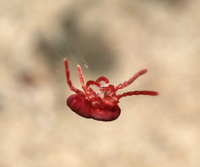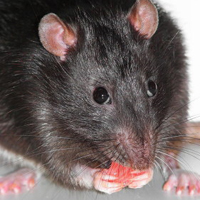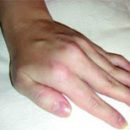Cleaning encephalitis (spring-summer encephalitis) is a natural-focal acute infectious disease characterized by fever, intoxication and damage to the nervous system, leading to the development of paralysis.
Content
Cause of tick-borne encephalitis
Disease pathogen - a virus capable of surviving in
ticks at low temperatures and high temperature sensitive.
When boiling dies after 2 minutes. In milk and dairy products
Save up to 2 months.
The source of the virus are ticks in which it exists indefinitely, transmitting to the offspring.
A person's infection is accomplished in the creation of a tick having a virus
tick-borne encephalitis, or eating goat milk and
Cows, Ta kki infected with ticks.
kki infected with ticks.
Spring-summer seasonality related to the period of the greatest tick activity.
Ticks are common in the forest and forest-steppe of Russia from the far
East to Western Borders. In recent years, the ubiquitous
Growing the incidence of tick-borne encephalitis. 70% of the sick - urban
Population using forests near cities.
The process of disease development
When the tick bite or through the gastrointestinal tract of the tick-borne virus
Encephalitis enters the blood and penetrates the cells of the central nervous
Systems, causing severe changes. The patient for others is not dangerous.
Transferred disease leaves persistent immunity to the disease,
However, some people have a virus preserved, causing chronic
Forms of the disease.
Signs
Diseases
Incubation
The period lasts from 1 to 30 days. The disease begins suddenly with
chills, rapid increase in body temperature up to 38-39 o s, strong
Headache, pain in all body, breakdown, weakness, sleep disorders,
nausea, sometimes vomiting. Face, sick eyes red. From 3-5 days of illness
Development of the nervous system.
Urgent care
The patient must be urgently placed in an infectious hospital for intensive treatment.
Having lost tick-borne encephalitis are under medical supervision
Depending on the residual phenomena of the suffering disease.
Disease Prevention
To prevent the attack of the ticks, the use of protective clothing and
repellents during the greatest tick activity.
The most effective protection against tick-borne encephalitis is
vaccination. Vaccination course consists of 3 vaccinations. The first two vaccinations
It should be done in the cold season (from November of the month) and finish
no later than 14 days before the start of the tick activity.
When
Singing a tick for its study on infection follows
go to the infectious hospital. With a positive result
Immunoglobulin against tickry injected injured
Encephalitis. His introduction is most effective within 1 day after
Singing a tick, after 4 days it is not carried out.









